53 Heartwarming Facts That Will Instantly Make You Smile

We often think of the unknown as something to be feared or approached with caution. But sometimes the things you didn’t know can be delightful and welcome, like a a sweet story you’ve never heard before, a quirky fact about an adorable animal, or just a tidbit of knowledge that makes the world seem a little kinder, warmer, and smaller. At a time when we have more than enough bad news stressing us to a breaking point, read on for 53 heartwarming facts that are more likely to put a smile on your face than a worry wrinkle on your forehead.
RELATED: 54 Hilarious and Random Facts You’ll Want to Tell Your Friends.
Heartwarming Facts Sure to Brighten Your Day
1. Sperm whales never forget a friend.
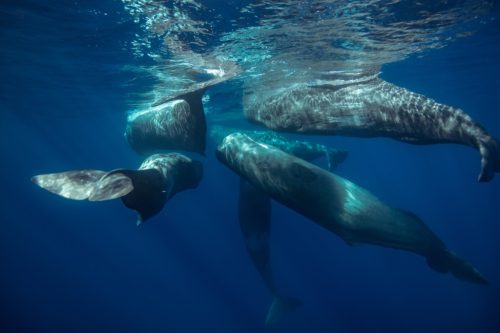
All whales are social animals, but the sperm whale in particular displays an ability to recognize and remember other individual whales. They even show preferences for certain other whales that remain consistent over their lifespans. Just like you’d rather spend your time with your best friends or favorite family members than other people, sperm whales have WFFs (whale friends forever), with whom they love to hang out.
2. An injured Olympic runner crossed the finish line with his dad.

At the 1992 Olympics in Barcelona, British sprinter Derek Redmond went into the semifinal round of the 400m race with the fastest qualifying time. Just after the 250m mark, however, he tore his hamstring. Somehow, he got back up and continued hobbling down the track.
As he went, his father Jim rushed in from the stands and wrapped an arm around his son’s back, helping him cross the finish line and creating an unforgettable moment for everyone watching. When the 2012 Olympics came to London, Jim Redmond served as a torchbearer for the Olympic Flame.
3. In Washington State, some prisoners rehabilitate cats.

In 2012, the Cuddly Catz animal rescue group started a program that paired cats with behavior problems with inmates at the nearby minimum-security Larch Correctional Center. Nonviolent offenders who meet certain criteria can volunteer to adopt a cat and receive training on how to give it the attention, affection, and socialization it needs to stop scratching, biting, or spraying. The cats issues improve, and the prisoners reap the benefits of animal therapy and learn how to care for another living thing. Similar programs exist where inmates train seeing-eye dogs.
4. One man’s blood saved more than two million children.

An 81-year-old Australian is known as “The Man with the Golden Arm,” but not because of his strength. Instead, James Harrison has a very rare type of blood plasma that can be used to treat Rhesus disease, which can occur during pregnancy. He’s been donating plasma roughly every three weeks since 1954, though in May of 2018, he surpassed the age limit allowed for plasma donations. Nevertheless, the 1,137 donations he made over his lifetime are estimated to have saved the lives of 2.4 million babies, including that of his own daughter.
5. Penguins propose to their mates.

Not only do penguins mate for life, but they also have a ritual to mark the occasion. But since they can’t get down on one knee, male Gentoo penguins “propose” by hunting down the smoothest, roundest pebble to present to their potential mates. If the female penguin accepts his offer, she adds the pebble to her nest and the two will soon breed. So important are these pebbles that male penguins have been known to fight over the most perfect ones!
6. Dolphins are known to save people from sharks.

There are hundreds of stories about human swimmers and surfers who end up in shark-infested waters but make it out safely because of dolphins. Pods of dolphins have been known to surround humans in distress, keeping sharks away. There are several theories as to why this happens—perhaps the adult dolphins are acting like parents defending their offspring, or perhaps the dolphins can recognize another mammal in trouble and act as they would if it were another dolphin. Regardless, many humans owe their lives to these intelligent sea creatures.
7. Rats laugh when you tickle them.
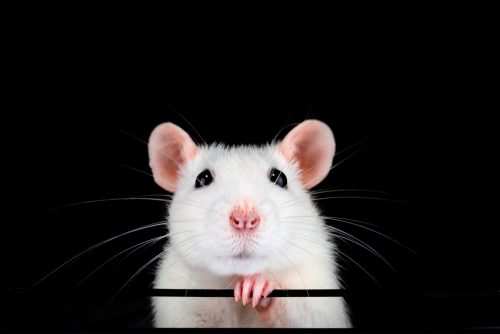
Both scientists and rats spend long hours in laboratories all over the world, so maybe it’s not surprising that, at some point, a group of scientists decided to try to tickle their four-legged friends. Once a rat is used to being touched by your hand, you can gently brush its back and belly, making it squeak and jump for joy. Best of all, the rats enjoy this type of play—when they got back to work, the scientists found out that tickling stimulates the release of dopamine, a neurochemical associated with pleasure, in rat brains.
8. An overlooked astronomer was finally recognized for her groundbreaking discovery.

The only female graduate student in the astronomy department at Cambridge University in 1967 made an important discovery—four pulsing light sources in deep space, now called pulsars. Her team published a paper, but her advisor, Antony Hewish, was listed as the first author. When the Nobel Prize committee decided their work deserved the prestigious award, only Hewish and another man received the prize. Finally, in 2018, Bell Burnell was awarded the Breakthrough Prize in Fundamental Physics, one of only four such awards ever given out. She has vowed to use the $3 million prize to establish a scholarship fund for struggling grad students.
9. Bhutan measures its success as a country in happiness.

In 1972, the king of Bhutan reported of his country, “Gross National Happiness is more important than Gross National Product.” This idea was so popular that it actually became official policy in Bhutan, and a Gross National Happiness Commission still works to protect what it calls the four pillars of happiness: equitable development, environmental conservation, promotion of culture, and good governance. Since then, other countries have also employed a happiness index to get a better picture of their citizens’ quality of life.
RELATED: 55 Fascinating World Facts You Need to Know.
10. Certain colors can inspire our moods.

While individuals may not all have the same emotional responses to all colors, in general, certain color schemes around us can affect mood. Reds and oranges are stimulating, whereas blues and purples promote relaxation. Gray, brown, black, and white are emotionally dulling—this may be good for doing important work, but it’s hardly inspiring in a creative sense. If you crave inspiration, try a little redecorating!
11. Winnie the Pooh cheers up sick children with phone calls.
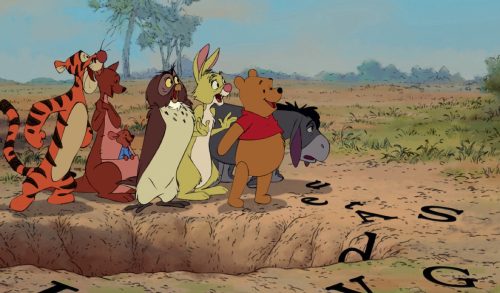
When actor Jim Cummings isn’t at work voicing Winnie-the-Pooh—and Tigger, too!—he volunteers with the Make-A-Wish Foundation, calling children in hospitals while staying in character. Sometimes, the children will smile for the first time in months when Pooh says hello, warming the hearts of their beleaguered parents, as well.
12. World War I paused for Christmas.

World War I represented something unprecedented in human history at the time—a truly global conflict that pitted world powers against each other. However, even in this grim setting, there was a tiny glimpse of hope. On Christmas Eve of 1914, an impromptu and unsanctioned ceasefire took place in many locations along the battle lines of the Western Front. Soldiers from both sides actually came out of the trenches and met in No Man’s Land, drinking together and even playing soccer. Though hostilities began again the next day, each side was briefly reminded of the humanity of the other.
13. Some animals make it off the endangered list.

While it’s true that new species of animals are becoming endangered all the time, it’s important to remember that our efforts to save them aren’t in vain. Animals whose numbers have risen because of dedicated human compassion include the manatee, the giant panda, the American alligator, the gray wolf, the humpback whale, the grizzly bear, the steller sea lion, the red kangaroo, and more. With continued conservation work, we can keep adding to this list.
14. Project Linus gives free handmade blankets to needy children.

Since it was founded in 1995, Project Linus—named for the blanket-toting Peanuts character—has given away more than nine million handmade blankets to children who need them. Adults and children who crochet, knit, quilt, or do any other craft that creates blankets can donate them to chapters of the non-profit organization across the country. Then volunteers known as “blanketeers” take them to local hospitals and shelters and give them to children. In 2012, Project Linus made a huge difference to victims of Hurricane Sandy.
15. Braille was invented by a teenager.

You’ve probably heard of Louis Braille, the man who invented a writing system of raised dots that allows blind people to read easily. However, did you know that he was only 15 when he invented it? Frustrated at the size of the existing books for the blind—consisting of full letters embossed on each page—he learned a military code language called sonography that could be read by touch and then simplified it. His schoolmates picked it up quickly and soon it became the standard language in schools for the blind.
16. A former NBA star is in the business of saving sharks.

Between 2002 and 2011, Chinese basketball star Yao Ming played for the Houston Rockets. He was popular all over the world and remains the only non-U.S.-born player to lead the NBA in All-Star votes.
After injuries forced him to retire, he turned his attention back to his home country, where poached shark fins for soup were decimating world shark populations. Working with a nonprofit called WildAid, Yao has used his popularity to educate his fellow Chinese people about the problems with shark fin soup, reducing its consumption by 50 percent in just two years.
17. Little free libraries are everywhere.

Perhaps you’ve seen a Little Free Library in your neighborhood—a box atop a pole that looks a bit like a large birdhouse but is full of books. Anyone leave a book or take one for free. Since 2009 when Todd Bol started a nonprofit to install these free book exchanges, the number of Libraries has grown from 100 in 2011 to 6,000 in 2013 to 75,000 in 2018. In 2022, the organization surpassed 150,000 registered Libraries in more than 120 countries worldwide.
18. Baby animals have delightful names.

We all know baby animals are adorable, but sometimes their names as just as cute as their appearance. For example, baby puffins are called “pufflings.” A kit is a baby fox—or a baby beaver (and might also be called a pup). A baby swan is a cygnet or a flapper. And finally, this author’s favorite—while it’s not official in a scientific sense, baby platypuses are commonly called platypups or puggles!
19. A motorcycle “gang” helps children cope with trauma.

When children grow up under conditions of abuse, they can understandably spend a lot of their time afraid, especially if they have to testify in court. That’s where Bikers Against Child Abuse (BACA) comes in. Fully dressed in black leather and logo jackets, they accompany these children to court, to school, or even through their neighborhoods. With a “gang” of big, tough bikers surrounding them, these children start to learn that the world doesn’t have to be a fearful place.
20. A woman bought an entire toy store just to give the toys away.

As Christmas of 2015 was approaching, New York resident Christine Suchman happened to pass a toy store that was closing for good. She was already in the habit of donating lots of toys to foster children every holiday season, but that year, she decided to buy the whole shop. She bagged up all the toys, stuffed animals, and school supplies and brought them to the city’s Department of Homeless Services. Hundreds—if not thousands—of children had a very merry Christmas that year.
RELATED: 37 Incredible Barbie Facts You Need to Know.
21. Liechtenstein has the most unusual military campaign.

The tiny, landlocked European country of Liechtenstein is one of the few nations with no standing army. In fact, the last military conflict in which they participated was the Austro-Prussian War of 1866, when they sent a regiment of 80 men to fight for Austria. Though these troops never did any actual fighting, the story goes that they soon returned to Lichtenstein with 81 men, as they had made an Italian friend along the way.
22. A six-year-old boy became a museum’s “Director of Fun.”

When he heard the director of his favorite museum was retiring, six-year-old Sam Pointon from Leicester, England, wrote a letter to the National Railway Museum in York. However, it was no ordinary letter—it was an application for the director’s job. Though the museum bosses recognized that Sam could hardly commit to a full-time job, what with his school schedule, they were so impressed with his love of trains that they invited him to the museum and even created a new job title especially for him: Director of Fun.
23. U.S. libraries outnumber McDonald’s nine to one.

McDonald’s has become something of a symbol of the worst parts of America: a tacky restaurant on every corner selling cheap, greasy food that fills you up but is terrible for you. Whether that’s a fair judgment is a question for another day, but the fact remains that, as of 2022 there were 13,444 McDonald’s locations in the U.S. but 123,627 libraries. Hopefully, it says something good about us as a country that we still value books so highly.
24. A celebrity chef feeds victims of hurricanes.

Recent years have brought severe hurricanes to the southeastern United States, Texas, and Puerto Rico. The damage, particularly in Puerto Rico, was severe, leaving many people without electricity or clean water for months. That’s when celebrity chef José Andrés jumped into action. Beginning in October 2017, his charity World Central Kitchen began cooking and giving away free meals, sometimes as many as 45,000 a day, to Puerto Ricans as they began to rebuild. His team stayed for a year and provided 3.6 million meals in all. But he isn’t done—as Hurricane Florence bore down on the East Coast, Andrés set up shop in North Carolina and did the same thing, delivering meals to shelters, response teams, and areas without access to food.
25. A Masai tribe donated cows to the United States after 9/11.
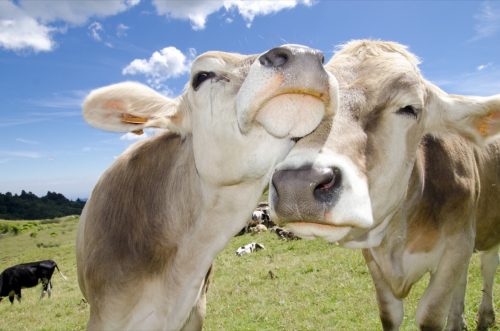
In the aftermath of the terrorist attacks on Sept. 11, 2001, many countries around the world offered their sympathy and support to the United States. Perhaps none gave quite so poignant a gift, though, as the Masai people of Kenya. In 2002, following their cultural traditions of helping each other through times of grief and struggle, they gifted 14 cows to the United States. It took some time to figure out what to do with the cows, but ambassadors ultimately decided that they would stay in Kenya and that their offspring would help provide an education fund for the generous tribe.
26. Looking at your old photographs can make you feel better.

If you’re feeling blue, you might want to pull out an old photo album or scroll through the pictures on your phone. A psychologist at Open University in the UK found that flipping through old personal photos can improve your mood and help you relax. In fact, it has a stronger effect than listening to music, having a glass of wine, or eating chocolate—all things that also have a positive effect on mood.
27. An astronaut wrote his daughter’s initials on the moon.

Most of us could probably name the first few men who set foot on the moon, but few could name the last one. Apollo 17 astronaut Gene Cernan was driving the lunar rover on a moon mission when he found a spot about a mile from the lunar lander. He knelt on the ground and wrote TDC—his daughter Tracy’s initials—in the dirt. Cernan passed away in 2017, but the lack of wind and weather on the moon means that his sweet tribute will remain in place for thousands of years.
28. Sea sponges can survive a blender.

When you think about inspiring animals, the sea sponge is probably not at the top of your list. However, these fascinating sea creatures have some unique qualities, including the fact that many of their individual cells can change functions to do whatever they need to. This means that you can chop up a living sea sponge or even stick it in a blender, but as long as the parts or liquid remains together, the cells can find each other, clump up, and begin to reform the living sponge. Even speedy cheetahs and majestic soaring eagles can’t do that!
29. The actors who voice Mickey and Minnie Mouse got married in real life.

In 1986, after voice actor Russi Taylor got the part of Minnie Mouse for Disney Studios, she soon met Wayne Allwine, who had already been voicing Mickey Mouse for nearly a decade. While working together on numerous projects, they became good friends, and a few years later when both were single, they fell in love. The couple married in 1991 and were rarely seen apart until Allwine passed away in 2009. Though Taylor has voiced many other characters—including Baby Gonzo, Pebbles Flintstone, and various characters on The Simpsons, Minnie was the character that helped her find her real-life Mickey.
30. Canada’s Tulip Festival has its roots in royal gratitude.

When the Nazis occupied the Netherlands in 1940, the Dutch royal family was quickly evacuated to the United Kingdom and from there to Ottawa. For three years, Prince Bernhard and Princess Juliana and their children lived in exile, adding a third daughter Margriet to their family while in Canada. When the war was over and the royal family returned to their home, the future Queen Juliana sent over 20,000 tulip bulbs to the Ottawa hospital where Margriet was born as a thank you gift. This started a tradition that has been repeated every year, enabling the annual Canadian Tulip Festival.
RELATED: 40 Ocean Facts That Will Blow You Out of the Water.
31. There’s a scientific name for the love of rain.

You might know the name of some unusual phobias, but there are also some fun names for the things people love. Many of them come from biological terms, but they can certainly apply to people as well. An ombrophile is someone who loves rain, while a heliophile loves sunlight. A psychrophile loves the cold, but a thermophile loves heat. If you’re a dendrophile who loves trees, you might also love wood (xylophile), forests (nemophile), or roots (rhizophile).
32. Smiling helps us understand other people’s feelings.

Smiling is a universal human expression—in fact, even people who have been blind since birth and have never seen a face will smile when happy. Smiles are even contagious. Our brains will often direct us to mimic the facial expressions of the people around us, which has the effect of helping us understand the way other people are feeling without requiring conscious thought. When we mimic the expression, we know what it’s like to feel that expression, and we can respond appropriately.
33. Music makes cows produce more milk.

A 2014 study out of the UK found that dairy cows who live in barns where music is played produce three percent more milk than cows who don’t have the benefit of entertainment. However, it can’t be just any music, because the cows are picky—only slow jams and ballads produce the effect. Fast dance music doesn’t work. It’s thought that the music helps lower the animals’ stress levels by drowning out some of the sounds of dairy machinery.
34. Jonas Salk put his life on the line for the Polio vaccine.

Throughout history, there have been many doctors and other scientists who have experimented upon themselves. Whether that’s really a good idea is up for debate, but Jonas Salk believed so strongly in the efficacy of his new polio vaccine that he and his family were the first test subjects. When its worth was proven, the vaccine was widely distributed, and the disease was essentially wiped out in the developed world. Salk himself became famous, but he refused to patent his creation, insisting it belonged to everyone and asking, “Could you patent the sun?”
35. Cuddling has lots of health benefits.

Humans are social creatures, hardwired to enjoy physical touch. Thus, it’s no surprise that cuddling with a loved one increases your body’s production of oxytocin, the “love hormone” known to lower stress, block pain, and even help you fall asleep. Positive touch also lowers blood pressure and promotes feelings of connection, so don’t be stingy with your hugs!
36. The Mars rover “Curiosity” is a huge success.

For the last 12 years or so, while you’ve been going to school or work and living your life, a robot has been trundling tirelessly across the surface of Mars, sending back massive amounts of information about the Martian surface and atmosphere. Think about that for a moment: a group of humans got together, built a robot, named it Curiosity, and shot it out into space much farther than any human has ever gone. It even got a sibling—in 2020, NASA launched a new rover to join it.
37. Vikings gave kittens to new brides.
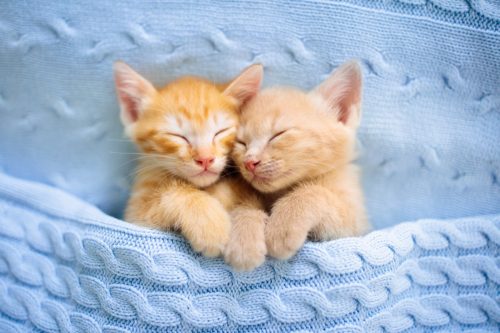
The Vikings of ancient Scandinavia weren’t quite the bloodthirsty brutes that Hollywood typically portrays. For example, on the occasion of a marriage, some Viking communities would give the new bride a kitten as a wedding present. Freyja, their love goddess, was said to ride in a cart pulled by a team of cats, so bringing a cat into a new household brought a blessing of love to the newlyweds.
38. Mister Rogers wasn’t putting on a “nice guy” act.
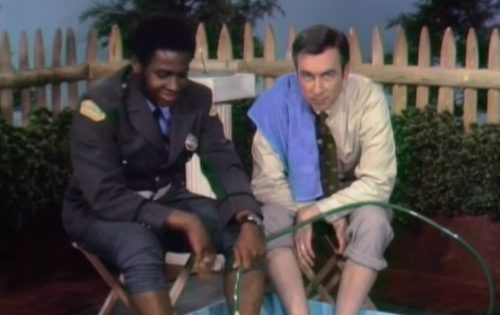
Especially from today’s point of view, a person as genuinely kind and compassionate as Mr. Rogers just seems too good to be true. No one could actually be that nice, right? Well, if Fred Rogers wasn’t perfect, he came close. Not only did he take the time to personally reply to every letter sent to him by a child, he fought hard to cast singer Francois Clemmons in the role of a neighborhood police officer. Casting a Black man as a figure of authority in 1968 was somewhat radical, and, over time, Mister Rogers’ Neighborhood made even more pointed references to inclusion. Amid outrage over the desegregation of pools, the children’s show famously included a scene in which Mister Rogers invites Officer Clemmons to cool his feet with him. The two men remained friends in real life until Rogers passed away in 2003.
39. Goats have accents.
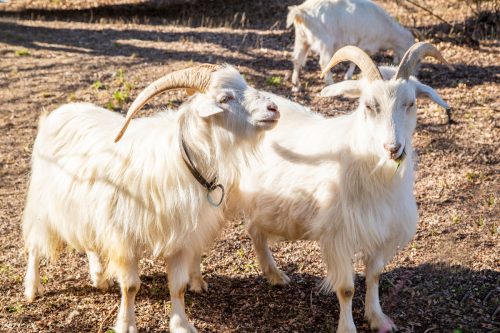
All humans, no matter what language they speak, have an accent. While there’s no such thing as a “standard” accent, some are more universal while others tend to be more difficult to understand for outsiders. Surprisingly, the same is true of goats. Goats who grow up and live together produce bleats that sound alike, but they may not be interpreted in the same way by goats from other groups. As we learn more about animals, we find that many of them have more vocal flexibility than previously assumed.
40. Music can make you a better person.

If music makes cows produce more milk, what does it do for humans? As it turns out, listening to music, particularly up-tempo beats, can actually increase feelings of generosity. Music with “prosocial” lyrics that advocate kindness and helpfulness actually promotes those qualities in listeners, making them more empathetic and less aggressive. In one experiment, German people who listened to Aretha Franklin’s song “Respect” actually showed more positive attitudes toward women!
RELATED: 67 Weird Facts So Strange, You Won’t Believe They’re True.
41. The inventor of the three-point seatbelt gave it away for free.

Cars in the ’50s, if they had safety devices at all, had only lap belts, which may have actually made accidents more dangerous. Then in 1959, Volvo engineer Nils Bohlin created a three-point seat belt like the one we know today, which adds a shoulder strap to the lap belt. It was quickly apparent that this simple device was an enormous leap forward for safety. Though Volvo could have kept it proprietary, they instead followed Salk’s example and opened the patent so that all car manufacturers could install the devices. This simple decision cost Volvo millions of dollars, but it has since saved millions of lives.
42. Dark chocolate is good for your heart.

You’ve probably heard that dark chocolate (a cacao content of less than 60 percent) is full of antioxidants, but did you know it’s good for your heart as well? Research shows that dark chocolate can reduce levels of LDL (bad cholesterol) and increase HDL (good cholesterol), making it harder for plaque to build up in your arteries. There’s also some evidence that it increases blood flow to the brain in the hours after you eat it. If you can pass up sugary white or milk chocolate for high-quality dark chocolate, your body will thank you.
43. A “Frankenstein” tree can produce 40 different kinds of fruit.

When Professor Van Aken found out that a nearby orchard was closing, he came up with a plan to save the many rare varieties of fruit grown on the trees. He bought the orchard, planned carefully, and began grafting various branches from different trees onto a main tree. Five years later, that main tree can now produce 40 different types of fruit. Since then, Van Aken has created 15 more “Trees of 40 Fruit“—which also blossom into multiple colors each year—across the country.
44. Swedish rabbits compete for the high jump championship.
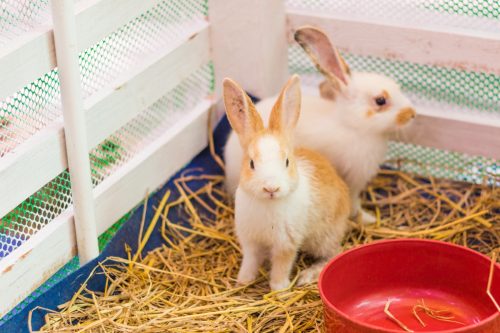
Dogs can compete in professional shows to prove their agility, intelligence, and persistence. Horses also put on excellent demonstrations of grace and dexterity. Why not give rabbits a chance to show their stuff? In Sweden, a contest known as Kaninhoppning pits rabbits against each other as their owners lead them over jumps and around obstacles to complete a course in the shortest time with the fewest errors. There are also high and long jump contests—the world records are 3.25ft (995mm) high and 9.8ft (3,000mm) long.
45. A dog came in seventh at the Elkmont Half Marathon.

One morning in Elkmont, Alabama, a young hound dog named Ludivine slipped out of her owner’s yard. She spotted a large group of humans, so she joined them, and when they started running, so did she. In fact, she ran for 13.1 miles, the exact distance of the town’s first half marathon. Fellow runners kept her hydrated and she ended up finishing in seventh place. She would have done even better if she hadn’t occasionally wandered off the route to get petted or sniff a rabbit. Ludivine received a medal for her performance, and the race is now named the Hound Dog Half Marathon in her honor.
46. Planning makes us happier than success.

According to a study published in the academic journal Applied Research in Quality of Life, people are happiest when they’re making plans for the future even if they don’t ultimately accomplish them. When studying people planning their vacations, researchers found that it is the anticipation of good things that gives us the most pleasure. So planning your dream vacation to the Caribbean—even if you haven’t got the time or money to actually go right now—might give your spirits a boost.
47. We really are made of stars.

The elements that make up all of our bodies—primarily carbon, hydrogen, oxygen, and nitrogen—are the same substances found in stars all across the galaxy, albeit in different proportions. Many of these elements were forged in the beginning of the universe, so the pieces that have come together to form your body may have been a part of a star or a comet or an asteroid. What this means is up to you, but it’s both humbling and impressive at the same time.
48. There’s a Marvel character who wears a hearing aid.
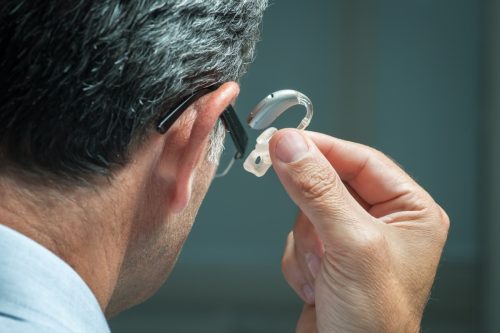
Pedro Perez, also known as “Blue Ear,” was created by Nelson Ribeiro and Manny Mederos at Marvel Comics back in 2014. The duo created the character in honor of a little boy named Anthony Smith, who refused to wear his hearing aids because he didn’t see any of his favorite superheroes doing the same. Not only did the move help highlight the needs of the hearing-impaired community, but it also turned out to be a big hit with kids based the U.S. and around the world!
49. Sea otters hold hands when they sleep.
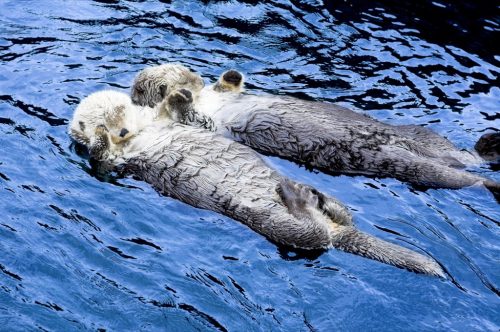
It’s an insanely cute behavior, and they do it so they don’t float away from one another while sleeping.
50. It’s illegal to own only one guinea pig in Switzerland.
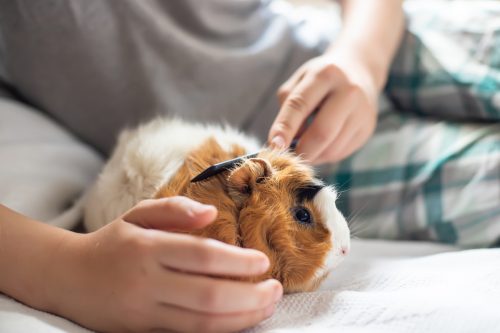
If you’re planning to adopt a guinea pig and happen to reside anywhere within Switzerland, prepare to make it a double. Apparently, these animals are so social that the country considers it animal abuse to get just one.
51. Macaques in Japan know how to use vending machine snacks.

While these little creatures look super-cute expertly using a man-made piece of machinery, the reality behind the stunt is slightly less precious. Apparently, the monkeys collect the coins needed to use these machines by stealing purses and wallets.
52. Puffins mate for life.
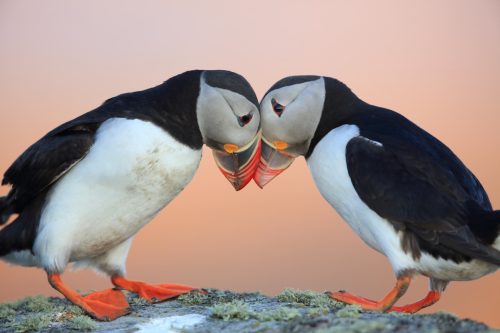
And by “life,” we mean anytime after the age of five, which gives them about a good 20 years together! While scientists don’t exactly know why some animals choose monogamy, it’s been theorized that having both mother and father present boosts the chances of their young surviving into adulthood. Puffins are in good company, too. Other animals who mate for life include beavers, coyotes, barn owls, and bald eagles.
53. The most peaceful period in history is happening right now.

While it may seem hard to believe given the media’s focus on war and violent crimes, we’re actually living in the most peaceful era of human history. Not only have stable governments around the world allowed for mediation and cooperation to prevent war, but technological and medical advancements help us live longer, more productive lives than ever. Of course, violent conflicts still exist, but widespread education and growing awareness of other cultures have helped—and may continue to help—improve quality of life and reduce the chances of early death.
Wrapping Up
That’s it for our list of heartwarming facts! Be sure to check back with us soon for more trivia. You can also sign up for our newsletter so you don’t miss out on what’s next!
- Source: https://mars.nasa.gov/msl/home/
- Source: https://mars.nasa.gov/news/8749/nasa-readies-perseverance-mars-rovers-earthly-twin/
- Source: https://www.mayoclinichealthsystem.org/hometown-health/speaking-of-health/choose-dark-chocolate-for-your-heart
- Source: https://www.ncbi.nlm.nih.gov/pmc/articles/PMC2837207/